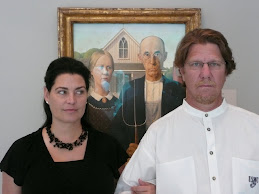As a younger man, in the days when I was a proud agnostic, I made it a point to stay out of discussions about “evolution versus creationism.”
I felt sorry for the folks arguing creationism, because it seemed so silly. On my side was the pure and accurate science I’d been taught in school, and on their side was a Christian magic wand where God created everything in seven days.
To me, that was the only issue: Science versus literal, seven-day creationism. Even upon becoming a Christian my views didn’t change a great deal, as I felt God set Darwin-described evolution in motion, which thus served as His tool for creation.
Then, six months ago, I was in Bluffton and asked Rev. Trip Cormeny what his views on creation were. Given the fact he was about my age, I assumed he was a “Christian Darwinist” like me.
“Prioleau,” he said, “do you understand what Darwinian evolution espouses? That over time creatures are born with beneficial mutations, and those improvements are passed along to future generations?
I indicated that, of course, I understood this.
“Well,” he said, “let me give you an easy-to-understand problem with this theory. Consider the eye: Millions of rods and cones, with a wiring to the brain that allows images to appear. Infinitely complex, right? Well, how do you evolve an eye? What good is half an eye? Or more appropriately, what good is a millionth of an eye? According to Darwin, it’s got to be beneficial to be passed along, so why would a creature pass along something useless like an incomplete eye? After all, the creature doesn’t know the next generation can take that millionth of an eye and improve on it, so why would it pass along? In my opinion, it doesn’t fit within the theory of evolution.”
I was more than a little stunned. We were having a discussion about evolution, and things were backwards: I didn’t have a pithy response, and Trip wasn’t arguing for literal seven-day creationism. How was I supposed to respond?
“Another issue is the complexity of our bodily systems,” Trip continued. “You’ve got a heart, lungs, a brain, a liver, two kidneys, a digestive system, a nervous system… and none of them can operate without the other. Take away one, and the others are useless-- and you’re dead. How do you evolve a completely interdependent system like that? Was some ancient mammal suddenly born with a working version of each?”
How does a brilliant guy like me respond?
“Are you saying,” I asked, “that you don’t believe Darwin’s theories?”
“No, I don’t,” Trip replied. “Read Darwin on Trial by Phillip Johnson. He does a good job explaining why the greatest lawyer in the world wouldn’t argue Darwin’s case in front of a jury and even hope to win.”
I’ve done a lot of thinking about evolution since that day last year, and I’ve done a little reading on the topic. I wrote up a draft of a column on evolution, and sent it to a friend who is both a physician, and a very devout Christian. His response? He said that debating evolution is ridiculous; it is as close to fact as a theory can be. He said in no uncertain terms that he believed evolution was God’s chosen method for creating man, and stated emphatically that evolution is not in conflict with scripture (and believe me, he knows scripture). As a coup’ de grace, he referred me to his daughter-in-law, who is getting her PhD in evolutionary biology. And while she was very kind in our correspondence, but she did an extemely poor job defending her position.
So, that should be the end of it, right? I had pondered the issue, and sought advice from some experts, and they told me to quit wasting my time.
The problem, though, is that I’m what the media calls a right-wing, religious zealot, and I couldn’t shake Trip’s points: How do you evolve an eye, or the interdependent systems that comprise higher animals? How do you evolve opposite sexes, and the reproductive organs. And most impossible of all, how do you evolve the caterpillar-butterfly trick?
And there are, no matter how you slice it, other problems with the theory of evolution. For instance, the fossil records have not borne out Darwin’s ideas—the missing links just aren’t there to show the evolution that’s now accepted as fact. And there’s certainly no fossil evidence linking man to ape. Oh, and if man is so closely linked to apes, why can’t we use ape tissue for transplants? Why is it that swine tissue most resembles our own? (Okay, don’t answer that).
The problems with evolution are, I believe, reflected primarily in the origin of life, and the origin of different species. After all, evolution does take place—scientists around the world study it everyday. Organisms change and evolve, and scientists study these processes for a myriad of important reasons.
But, I believe, these scientists might be studying a micro-process, and assuming it applies to a macro-process as well. They see evolution occurring, and extrapolate that this evolutionary process could, with enough time, turn an amoeba into a human. Even scientists, however, are completely in the dark as to how life “just occurred,” and what forces (of pure nature) brought forth that original single-cell organism that allegedly served as ground zero for all other life.
As I’ve pondered the topic over and over, the “evolutionary issue” that really hangs me up is the emotions that we humans experience-- emotions that seem to offer no benefit to the Darwinian concept of passing along one’s individual seed. After all, in the animal kingdom, that’s what it’s all about, right? The largest male uses his size and strength to mate with the most females, and then roughs up (or kills) any males who try to do likewise. This system works flawlessly for the animal kingdom, but for some reason it doesn’t work for humans. Why? How did we ever get beyond it to civilization?
And where does empathy come from? Where does selflessness come from? Where does self-control come from? How about charity? And perhaps the most anti-Darwin concept of all, self-sacrifice-- The willingness to die for another person, or an ideal? Last time I checked, there weren’t too many cases of adult, male gazelles throwing themselves into the lion’s mouth so the herd could escape… and yet this sort of behavior is practically commonplace among mankind. How? Why? Dying so that others might live is a really, really, really lousy way to pass along your individual seed.
Yes, it’s good for mankind, but not for the individual man doing the dying. These behaviors run in complete opposition to all of Darwin’s ideas, and I’d love to hear from an atheist their theory on how dying can be passed along as beneficial behavior.
In exploring the topic of evolution, it’s become more obvious than ever to me that God’s hand yielded mankind. In my opinion, we are simply too different from the rest of nature for there to be any other explanation. The issue of “evolution versus creationism” is, however, more complex. Are we creatures of pure evolution? Literal, seven-day Creationism? A combination of the two? Intelligent Design (aka God’s Hand)? Is an amoeba at the tippy-top of our family tree? Are the giraffe and the penguin our distant cousins? Are air-conditioning, cable TV, and pizza all just part of the dumb luck we call evolution?
If I get into Heaven, this will be one of the first issues I ask about. Right now, I’ve got to say I no longer believe in pure evolution as it pertains to the origin of the species; it strikes me as a classic case of man attempting to explain a very large issue using a very small vocabulary. Yes, I do understand that evolution occurs, and the study of evolution is vital. What I don’t buy is the concept that science can explain life devoid of an intelligent designer.
In closing, I think it’s important that I point out that creationism and evolution are not a “hot button” issue that divides Christians. Yes, the media wants you to think that all Christians are creationists who hate evolutionists, but that’s not the case. In fact, it’s a topic that’s rarely discussed in church. There are many, many Christian Darwinists, and I don’t begrudge them their opinion for one second.
Up until six months ago, I agreed with them.
Wednesday, February 17, 2010
Subscribe to:
Post Comments (Atom)



No comments:
Post a Comment